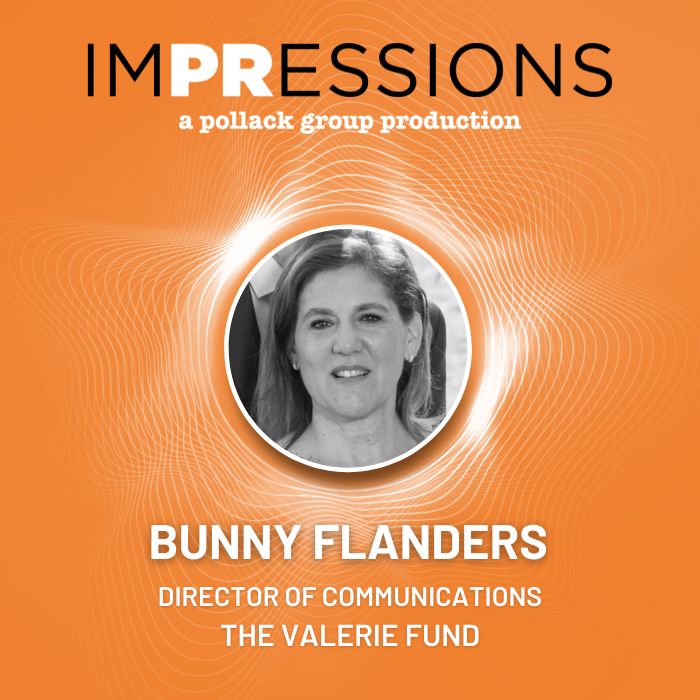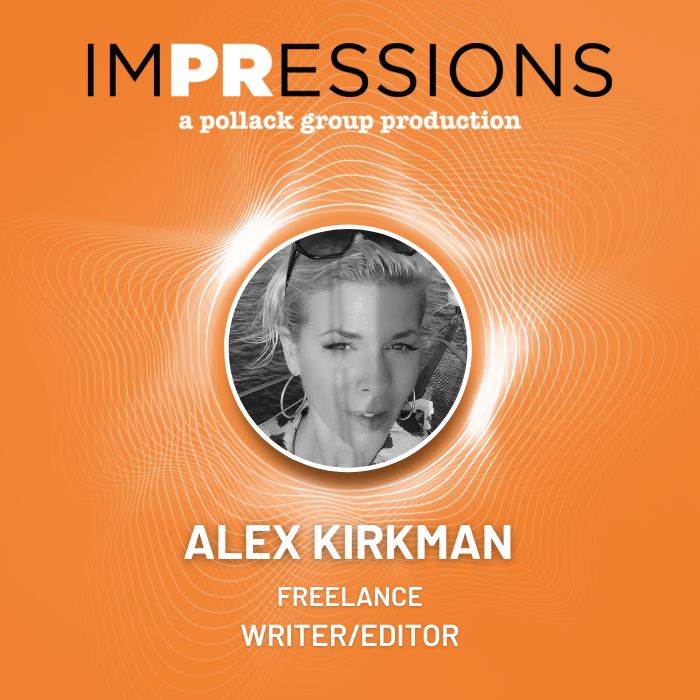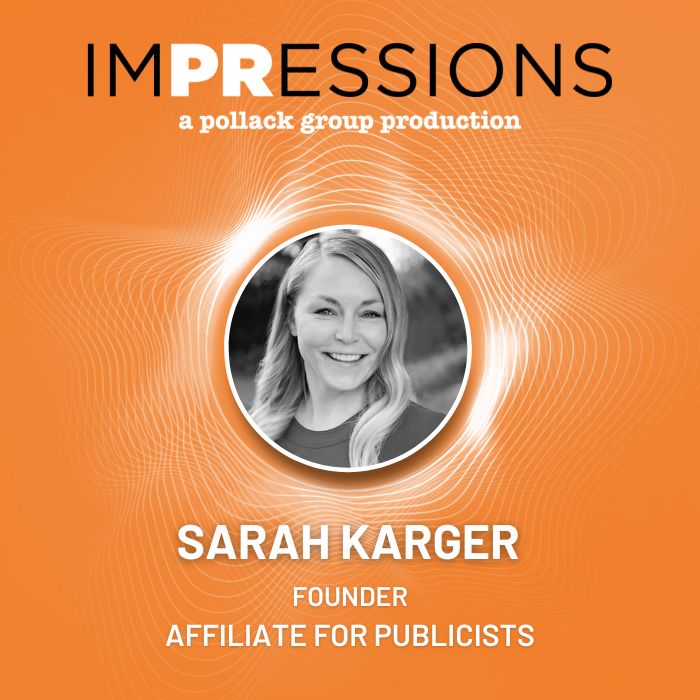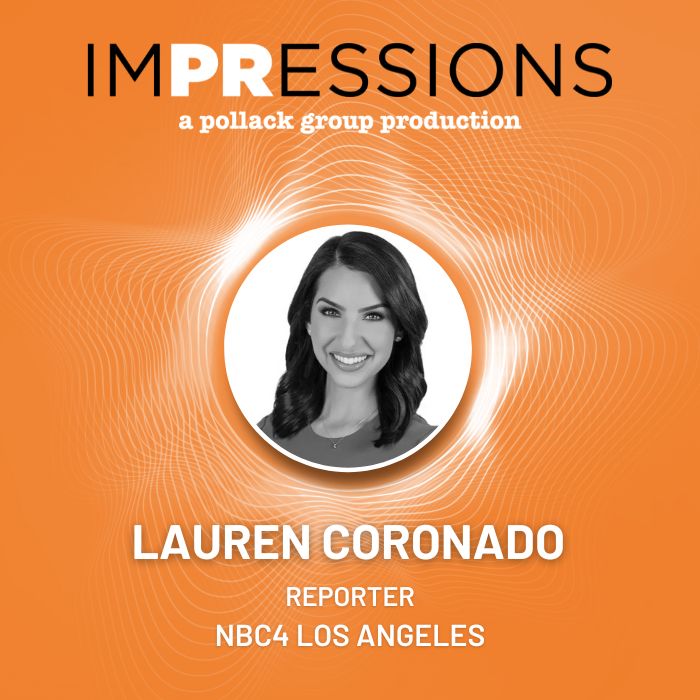
November is Cancer Awareness Month, and this week’s imPRessions episode spotlights a company that has been changing lives for children and parents battling pediatric cancer. The Valerie Fund (TVF) has been a beacon of hope for decades, and as we approach 2026, the non-profit will be celebrating 50 years of providing care centers, fundraising, emotional support programs, and events to help those face the unimaginable. Today’s guest, Bunny Flanders, is TVF’s Director of Marketing and Communications, and joins Jenn and Kalli to discuss how the organization continues to raise awareness and donations to support its mission.
For more information, visit the Valerie Fund’s website.
imPRessions S3 EP 17 Transcript
Kalli
Hey Jenn.
Jenn
Hey Kalli.
Kalli
So, Jenn, are there any nonprofits that you’ve worked with in the past that were really meaningful for you?
Jenn
Yeah, I definitely love to volunteer. I worked for a nonprofit in New York called Maureen’s Haven that helped homeless people get access to resources and also provided them shelter. And I facilitated a really cute event at a brewery where we had like an ugly sweater contest. It was during the holidays, and all the proceeds went to them. Definitely, a lot of nonprofits, especially in New York, need help and are doing really great, amazing things.
Kalli
Yeah, I’ve worked a lot with nonprofits. Actually, at the beginning of my career, I worked from an agency standpoint and actually today’s guest we’re going to be working with… she is the Director of Marketing and Communications at The Valerie Fund. Bunny Flanders has been there for the last 20 years, and she’s really been a huge part of growing the organization. They do major events and campaigns every year. They’ve worked with some of the biggest names that we, household names like Burger King, ShopRite, Jersey Mike’s, have a couple of really exciting things coming up. So, I thought it’d be nice to have her come on and really just talk to us about… they’re about to celebrate 50 years of health care support for children. So, I thought this would be a good opportunity to sit down and have a chat with her about all the great work that they’re doing and how they’ve continued to engage and motivate people for 50 years.
Jenn
Yeah, that sounds wonderful. I’m really excited to talk with them. I know that our agency is going to be doing some work to help promote their 50th. And yeah, let’s get to it.
Kalli
In a world where medical technology continues to evolve, saving lives of those affected by cancer, one organization in particular has dedicated time and resources for almost 50 years, helping families finance cancer treatments for their children. From medical care to psychosocial services, The Valerie Fund has become a lifeline for thousands of families navigating the unimaginable. Today’s guest has served as the Director of Marketing and Communications for 20 years and has been instrumental in producing events, campaigns, and has helped generate over $3 million annually in funds. Today, we welcome Bunny Flanders to discuss the legacy of the organization, the evolution of its mission, how they’ve approached messaging and community engagement over the years, and of course, how they’re planning to celebrate 50 years of impact in 2026. Hi Bunny. Thanks for joining us today.
Bunny
Thank you for inviting me. I appreciate it.
Jenn
Oh, no, this is really, really exciting. We’re really happy that you have decided to be a guest. I think there’s a lot of really great things that we can cover today about the Valerie Fund. Before we kind of really dive into it, for those that may not be too familiar with the nonprofit, can you share with us the origin story of the Valerie Fund and tell us a little bit about its mission and how it has grown today?
Bunny
Absolutely. So, in 1976, which goes back 49 years, almost 50, Sue and Ed Goldstein, the founders of The Valerie Fund, had their daughter being treated at a hospital in New York, which was called Baby’s Hospital and is now Columbia. She was being treated for a type of bone cancer called Ewing Sarcoma. And for six long years, they traveled in and out of New York. It was really difficult. It was difficult on the family. It was difficult on her sister. It was difficult on Valerie. She was, you know, having, you know, symptoms going back and forth in the car. And after battling cancer for six long years, they lost her. And I say this, and I’ve said this hundreds of times throughout the last 20 years, but Sue and Ed Goldstein, from their grief, they became real and true change makers. They brought pediatric oncology and hematology treatment to New Jersey for the very first time. The original mission of The Valerie Fund was to treat children close to their home. And now you fast forward 49, almost 50 years, and we now treat 6,000 patients each year at 8 treatment centers throughout New York, New Jersey, and metro Philadelphia.
Jenn
It’s so incredible.
Kalli
Yeah, that’s really amazing how much it’s grown. And, you know, 2026 actually marks the 50th anniversary of The Valerie Fund that, you know, I mentioned before. It is such a powerful milestone, especially with the amazing work you’re doing. So, can you share a little bit about how the organization is planning to celebrate?
Bunny
So we’re just, we’re in the planning phase and we are planning right now some of the things that we’re doing in preparation for our 50th anniversary is we’re collecting stories. Stories from our patients, patients going back, you know, 49, 50 years, stories from the caregivers, stories from the parents of the patients, reconnecting with, a legacy of 50, almost 50 years of patients, caregivers, and parents, and how The Valerie Fund impacted them and where they are today. And it’s so amazing to hear that there’s actually so many of them that have gone into many different types of health professions because of their experience as a child having pediatric cancer or a blood disorder. And it has definitely impacted their life choices. So that’s one of the things that we’re doing right now, gathering all of that information. We also are looking at putting together a very special event. We haven’t really finalized what that might be, but we expect to have 50th anniversary activities throughout the entire year. We’re super excited about that.
Jenn
And you’re working with this fantastic PR agency I heard that might be helping you with some of that planning.
Bunny
Exactly.
Jenn
No, we are really excited to partner with you on this incredible milestone. And we have our own milestone this year. This is our 40th anniversary at The Pollack Group. So, we thought what better way than to celebrate all the work we’ve done and all the achievements that we’ve had by giving back. And so, The Valerie Fund was chosen by us and we’re really passionate about what you’re doing and we think it’s just absolutely wonderful. And even the story, just to go back to what you were saying before about the parents sort of finding some vision through grief and they could have just, you know, coiled up in a ball and grieved the loss of their child and everybody would have totally understood that. But instead they gave back and found a way so that other families possibly didn’t have to go through the heartache that they were going through. And I just think it’s very beautiful.
Bunny
Yeah, it’s amazing.
Jenn
Yeah. And so, I want to, it is a sensitive topic, you know, cancer, especially pediatric cancer. So, when you are putting together marketing and PR plans, how do you balance storytelling around something as delicate as this? But still being able to create campaigns that engage and motivate the public. But again, we want to be mindful that this is very sensitive. How do you balance all of that?
Bunny
Yeah, so, you know, basically, you know, one of the things that’s kind of a philosophy that we use is, you know, the patients are not their disease. They’re people. And while they’re going through the period of treatment, which typically for an oncology patient could be, if they had, regular garden variety leukemia, would be either 2 1/2 or 3 years. We try to, learn about who the patient is and, who they are, not just focusing on their disease and what they have, because when you learn about these kids, and I’ve had the incredible honor of meeting so many of them over the last 20 years, the bravery and courage and resilience, those are the words that I would really put to many of the kids that I’ve met, no matter whether they’re going through chemo or they’re going through radiation or they’re getting blood transfusions or they’re, you know, we try to keep, The Valerie Fund, part of our philosophy through all the psychosocial services that we provide is to try to maintain the most normal life that can possibly be during this difficult time period.
Kalli
That’s so important. And like you said, it is, it is a difficult time. So, it’s definitely hard to create events and things that are going to really maintain that emotional resonance year after year in a way that is sensitive. So, I know you have a lot of annual events, there’s a walk and corporate fundraisers like the golf tournament, those are major touch points. So, how do you go about planning and promoting these in a way that does maintain that sensitivity, but also the resonance year after year.
Bunny
Yeah, so the walk is a celebration of like all The Valerie Fund kids and their bravery and resilience. We had at the park, although it was a little rainy, we had about 2,000 people at the park and there were over 100 Valerie Fund patients and their families. And it’s their day. And I was able to identify two young men who were The Valerie Fund speakers. One of them was a 17-year-old who’s being treated for cancer, and he plays lacrosse. And he gave a speech talking about how The Valerie Fund had helped him through his treatment, which he’s still in treatment, and he’s finishing in July. And then we actually had another young man who’s a sickle cell patient. Sickle cell disease is the number one blood disorder that we treat throughout our eight Valerie Fund centers. And our center at Newark Beth Israel has one of the highest, you know, censuses of sickle cell patients in the country. I know that we have over 400 families. He spoke about his journey and he was treated at The Valerie Fund from the time of his birth until just six months ago when he actually received a stem cell transplant that actually cured his sickle cell. So, it’s pretty amazing to hear that. But we just want our donors and the people who are attending our events, whether it’s a golf outing or a gala, we want them to know. We want them to, what we try to do is we try to get them, you know, we make sure that they’re meeting patients, whether it’s on video or in person through speeches, so they can like learn firsthand how these children were helped. and how we impacted them getting through their treatment.
Jenn
That’s incredible too about sickle cell, that somebody basically found a cure for that. So, is that a cure just for that individual person just really resonated with the treatment? Or is this something that anybody with that disease can now look towards this type of medical?
Bunny
No, the stem cell transplants is, you know, I’m not a doctor, so I can only say that I know that there are certain criteria that the patient has to have, which creates them to be eligible. But yes, it’s, you know, whereas this was not something we were talking about like 10 years ago. I actually know 3 different patients in the last year, maybe even 4, who’ve received this groundbreaking treatment such that they’re actually cured from their sickle cell. Because while cancer can be cured, sickle cell cannot. It’s a lifelong disease and it, you know, it impacts people, you know, very significantly, and I guess less of the public knows about sickle cell disease than they do about cancer.
Jenn
Right. So very interesting and good to see medical direction kind of taking off with so many of these advancements, regardless of cancer, I mean, so many diseases. So, I want to ask a little bit about the transformation of marketing. So, The Valerie Fund has been around almost 50 years. So that surpasses social media and digital marketing and a lot of components of marketing that we use today. So, I’m curious how you could tell us how The Valerie Fund has implemented digital marketing, e-mail marketing, social media, influencers, all of that kind of newer components of marketing. How does it impact the way you fundraise today and spread the word? How is sort of The Valerie Fund evolved in this area of growth?
Bunny
So, for our larger public events, like our walk, some of our other public events, we definitely are using, I guess you would call e-mail marketing through blasting. We’ve, since I got here 20 years ago, we started to collect e-mail database. We now have a proprietary database of over 30,000 emails that are donors who have donated, you know, to us over the course of the last I don’t know, 10, 15 years, we’ve come up with strategies to talk to them, whether we’re direct soliciting them to give to a particular event or to come to the park or to steward them and have them know about something that’s happening at The Valerie Fund. As an example, through another one of our events, we were very fortunate and are very, very grateful that the Yankees, the New York Yankees, selected The Valerie Fund for their Week of Hope. And I can truly say that they picked us because of stuff that they saw on social media and information that they were able to access about another one of our events, which is karaoke for the kids, which happened, has occurred for the last 20 years. It’s a big karaoke party for all the networks, television networks, and digital media and ad agencies in New York. And over the past 20 years, it’s raised over $3 million. And they saw some clips that were taken from it on our YouTube channel. And they liked what they saw. And it turned into them selecting us. So tomorrow, 15 Valerie Fund families are going to be doing karaoke with some of the Yankees players and managers. And then they’re going to have lunch, and then they’re going to get a tour of Yankee Stadium, batting practice, and one of our 14-year-old patients is actually going to throw the first pitch.
Jenn
Oh my God. So, I’m a huge Yankee fan and I’m a huge karaoke fan. So, like, this is so cool. That is amazing that they chose you. I love that.
Bunny
But I can actually tell you it’s all from social media, e-mail marketing, what we, I guess, because I am a boomer. I have been in advertising and marketing for more than the 20 years that I’ve been here. I was previously at an ad agency for 24 years before that. So, like new media got the Yankees to notice us and the, you know, the branding power of having the Yankees organization spend the day with us tomorrow is extraordinary. There’s going to be interviews on YES TV. There’s all sorts of activities going on. But it’s really, really exciting. So, I can tell you, new media, digital media, e-mail marketing, all of it works.
Kalli
That’s amazing. And sometimes you forget, like when you’re just scrolling through and looking and hearing all about like Labubus, there actually are really important stories being told like The Valerie Fund. And I’m so happy that you’re going to have that moment tomorrow. And I’m excited to see like everything that comes out of it.
Bunny
Yes, we’re so, we’re so, grateful. It’s gonna, it’s really, we’re just so, grateful for being selected. And I think it’s like a very amazing example, you know, of marketing and how it works.
Kalli
It really is. And you said that you’ve, obviously you’ve been with The Valerie Fund for 20 years. You had a career at an agency before then. Just kind of looking back, is there a moment in your career with, you know, when you were working with The Valerie Fund that really felt like a true PR win? I mean, obviously we just talked about, you know, the Yankee opportunity coming up tomorrow, but wondering if there was something previously that happened that was able to really move the needle in a way that really surprised you in its success.
Bunny
I mean, a couple things come to mind. Most recently in 2023 and 2024, we were selected by Jersey Mike’s to be the New Jersey charity of choice for 2 years, ‘23 and ‘24, which for their day of giving, which is the last Wednesday of the month, in ‘23, they donated $1.3 million and in ‘24, they donated $1.8 million, which really moved The Valerie Fund needle forward, donating an additional $3 million over the course of 2 years. That was like a surprise to our budget because we didn’t know it was going to happen. Really, really moved the needle forward. It was a huge PR win because yet again, an organization like Jersey Mike’s, they have an extraordinary digital marketing crew, as well as advertising team, as well as PR team. And it gave us a lot of branding. A lot of people heard about us. We were, you know, we got a lot of exposure. You know, prior to that, like in the first couple years that I was here, I would say it was within the first three years that I started at The Valerie Fund, literally shift getting them online, like developing the first Valerie Fund website, was a big win, and a big change. And since then, we’ve redone the website like 3 or 4 times. Now we’re looking at more than 50% of our donations annually coming in electronically.
Jenn
I also love Jersey Mike’s, so many synergies here.
Bunny
I know, we’ve been so lucky, but I think it’s because we put it, we work really, really, really hard. So, it gets, it’s lately I’ve been feeling very great that it’s gotten noticed.
Kalli
You know what, you’re working really hard, and you’re also, you know, like you’re doing great work. Like what you’re doing is so important and so impactful. So, it’s wonderful that it’s being noticed and especially noticed by organizations that really are able to help.
Bunny
Yeah, thank you.
Jenn
It really is wonderful. And I know we’ve covered a lot of ground today. There’s a lot of exciting things happening. There’s a lot of amazing history behind The Valerie Fund. If you could tell the public one thing that they don’t know about The Valerie Fund, but they should, what would it be?
Bunny
I think it’s really important for everybody to know this because it’s not, people who are not kind of looking at this. So, all these big things that I’m telling you about, The Valerie Fund only employs 10 people. So, I think it’s important for everybody to know that out of every dollar, between 81 and 84 cents of every donation is going to the programs and services that we provide to the children and families of The Valerie Fund. So, we’re not at all in an administratively heavy organization. And if I, looking back to when I didn’t work here, if I were a donor and I was going to make a choice of where to give money, I would very much want to know that it was going to what I wanted it to go to.
Kalli
That’s great. And, you know, a lot of people, when they donate, they want to know like how, what the percentage is of where their money is going and making sure that it’s going to make a difference. So, thank you for sharing that.
Bunny
You’re welcome.
Kalli
You know, one other thing that, and a parting note, you’ve already had some, you know, we’re celebrating a big milestone this year. So, wondering, what’s the one thing that you hope The Valerie Fund is known for in the next 50 years?
Bunny
Wow, that’s a good question. I guess what I believe is that we’re able to, with the growth that we’ve had over the last couple of years, I’m very proud that we’re going to be able to expand into some new geographic locations. And that, I think The Valerie Fund model would be a great model for other pediatric cancer organizations throughout the country because the psychosocial services that we provide, while we’re not paying for the doctors or the nurses, we’re paying for the child life and the social work and the educational liaisons and the integrative medicine. These are the members of the team that help the patient and the family get through the treatment. So, you know, while the doctors and nurses are taking care of the medicine, getting them through the treatment, I think, helps them with more successful outcomes. And over the next 50 years, I think that we’re going to be doing some research that’s going to show this, that, not just giving them medicine or, giving them a transfusion, but that, treating the whole child, the whole family is critically important to positive outcomes.
Kalli
That’s so true. And I will, I’m excited to, in the future, be working with you and hopefully helping make that happen, taking the next step. So, Bunny, thank you so much for joining us today and for sharing.
Bunny
You’re welcome. Yeah, of course.
Kalli
You know, we’re happy to have you. And like we said, 2026 is going to be a very special year for The Valerie Fund. And we are, again, just really thrilled to have discussed how impactful the organization is. And again, thank you. And we’re so glad nonprofits like yours exist and really, truly appreciate the time you take to promote all the wonderful things that The Valerie Fund has done for pediatric cancer. So really, truly, thank you so much for being a guest.
Bunny
That’s great. Thank you. Thanks for inviting me, and I look forward to working together.
Kalli
Of course. And to our listeners, thank you for tuning in. Be sure to follow The Pollack Group on social media to get updates about our show, and feel free to reach out anytime with questions or guest suggestions at impressions@pollackgroup.com. Bye for now.





